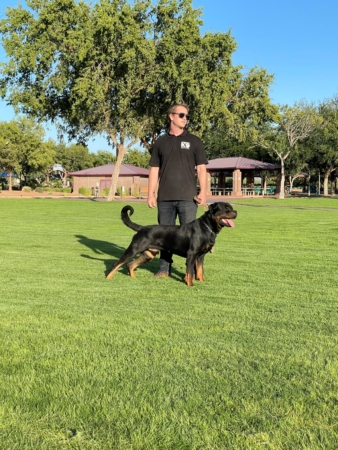Integrity K9 Services Protection Dog Handlers
Training our dogs to be the ultimate protector and companion is the most important work we do. Training their handler however, is a close second. The single best thing you can do for your dog is to become a great dog handler.
Being a good dog handler involves indefinitely dedicating a portion of your time to dog behavior education and practice. A great dog handler will continuously push themselves and seek out new research, information, great trainers to learn from and websites and social accounts that share educational information on dog training. A great handler will also practice every single day. Just like a dog needs training every single day to keep up their skills and to see improvements, so does a dog handler. Training and taking care of a dog does not happen perfectly overnight. Consistency and dedication are key to becoming a great ally to your dog.
Being a great dog handler involves more than just being able to teach your dog some tricks. Some of the main things included in being a great dog handler are: building trust between you and your dog, taking care of their mental and physical well-being and being able to communicate effectively with them. Let’s talk about each of these things below.
- Training your dog so that they can live happily with you and assimilate into society where needed.
A good dog handler understands training techniques, positive reinforcement methods, and how to modify behaviors effectively. By being knowledgeable about training, you can teach your dog appropriate behaviors, address any issues or challenges, and foster a well-behaved and happy dog. You do not have to be an expert dog trainer to help give your dog some of the benefits of training! Even small training sessions between handler and dog will benefit the relationship and foster an environment of learning for your dog. If you feel like you are not able to give as much training as you’d like to you dog, taking them to a trainer is a great, and encouraged options as well.
2. Taking care of your dog’s mental well-being.
There are a few things we can do to help dog’s maintain good mental health.
a. Dog’s need mental stimulation to be happy. They are much smarter and much more clever than we sometimes give them credit for. If we do not provide mental challenges for them they may become sad and even depressed. Mental stimulation includes learning a new trick, puzzle toys, interacting with them, and social time.
b. Daily exercise. Exercise provides many physical benefits but is also a great way to help your dog to be happy and contented. While dog’s exercise they take in and process the world around them, exercise can help them destress, decompress and regain energy for the rest of their day. Not unlike the effect of exercise in humans. Tailor your dog’s exercise time to their breed, personality, age and energy levels.
c. Focus on routine and predictability. Dog’s thrive when they have a somewhat set routine and schedule. They catch on to their owner’s routines, no matter how small, very quickly. They might even notice if you change into your work clothes before brushing your teeth if you normally do it the opposite.
d. With all that said, make sure you do not OVER-stimulate your dog or this may stress them out. be mindful of your dog’s communications and if they signal to you they are tired or have exhausted their mental capacity on a task, let them rest.
3. Taking care of your dog’s physical well-being.
Taking care of your dog’s physical well-being includes everything from normal vet check ups, educating yourself on your dog’s breed and potential health predispositions and feeding them a healthful diet and including plenty of exercise in their day. If you have a working dog make sure to incorporate their favorite type of exercise into their exercise schedule. Agility training, dock diving and retrieving tasks are all great sports for working dogs.
4. Communicating effectively with your dog.
Dogs primarily communicate through body language and cues. A good dog handler understands and interprets their dog’s signals effectively, leading to clear communication and understanding between the two. This helps establish trust and strengthens the bond. Each dog communicates differently based on their breed, personality, learned habits and more. It is the handler’s responsibility to learn their dog’s communication style and respond effectively.
Have questions about becoming a great dog handler? Contact us here.


